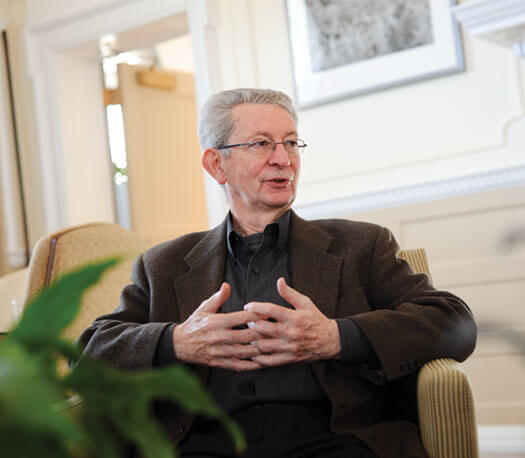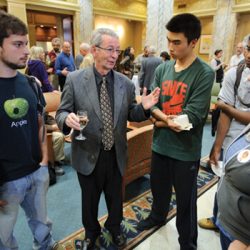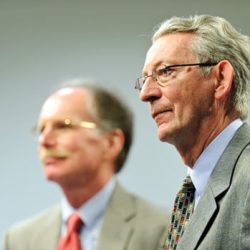Ward 2.0

Interim Chancellor David Ward says UW–Madison can lead the way in finding innovative solutions during difficult times. Photo: Jeff Miller
In his second term at the helm, Interim Chancellor David Ward isn’t sitting idly by.
David Ward is not a seat filler.
Since returning to UW–Madison in the role of interim chancellor last summer, Ward MS’62, PhD’63 has confronted complex questions and issues central to the university’s future in the wake of a bruising budget battle that leveled deep cuts and left some scars.
He has also proposed some ideas that, he admits, some may not like, but that he believes are key to moving forward with the UW’s goals and mission.
“Either you decide [as interim chancellor] you’re a caretaker, or you decide to try to make a difference,” Ward says. “I have a passionate commitment to both the institution and to the survival of higher education.”
Ward served as chancellor from 1993 to 2000, then led the American Council on Education in Washington, D.C., for seven years. Last October, Kevin Reilly, president of the UW System, extended Ward’s interim appointment until June 2013 at the urging of faculty, staff, and students. The search for a new chancellor will now begin in September 2012.
“How many people get a chance to return to a job that meets both a love of institution and a love of higher education?” Ward asks. “With a two-year term, it would be a waste for me not to at least put on the table an agenda that commits to major changes. We need to be at the forefront of educational innovation if we are to retain our competitive edge over the next decade.”
In a conversation with On Wisconsin in his Bascom Hall office, Ward discussed some of his priorities. Alumni, he notes, are “our best friends and advocates” in raising awareness that the overarching dilemma is sustaining innovation with limited resources.
The State of UW–Madison
“We are no different from any other major public institution,” Ward says, as the university absorbs $47 million in state budget cuts and faces an additional one-time cut of $24.6 million during the next two years to balance out sluggish state tax collections. Every top research institution in the country is financially stressed and, Ward estimates, only about two dozen private universities — with large endowments — are well positioned to withstand fiscal challenges. The universities that cope most effectively now with declining public support and tuition rates tied to budget and tax policy will be the most competitive long term, he says.
“What we need to be doing is leading the way in innovating our way out of this,” Ward says. “While we will be aggressive in making the case for increased public funding, the current fiscal and economic environment makes [an increase] unlikely in the short run.”
First up is using the flexibilities granted in the most recent state budget to design a personnel system to address UW–Madison’s unique needs. Another key aspect of the budget challenge, Ward says, is funding large-scale, inter-departmental research, as longtime sources for individual grants are vulnerable to federal budget cuts.
Educational Innovation
How can the UW move forward without a significant infusion of new public money? One way is by looking beyond the four-year, residential-degree model, says Ward, who is spearheading a new initiative on educational innovation.
“Can we, in fact, think of some different models by which individuals can receive their degree under somewhat different circumstances?” he asks. These models could mean part-time degree programs for those who have to work, for example, or year-round classes, or three-year degree programs for students who enroll with significant advanced-placement credits and are ready to declare majors.
Ward would also like to see the UW combine increased access through online instruction with enhancements to traditional face-to-face learning. The concept — called blended learning — would, for example, allow more students to enroll in high-demand courses online, avoiding the capacity limits of physical classrooms; introduce course content earlier and let students learn at their own pace; and “create a higher priority on discussion and understanding, because content is being handled more online,” he says.
A Renewed Partnership
Another top priority, Ward says, is repairing and reinforcing the relationship with UW System following a failed proposal to establish a public authority to govern UW–Madison. Ward says UW System “provides a vehicle of enriching our connection with the state,” particularly through students who transfer to UW–Madison from other campuses or enroll in graduate school. Maintaining access is critical, and helping low-income students with need-based financial aid is another priority, Ward says.
In turn, he hopes to improve relationships with UW System by stressing the unique mission and “sheer scale” of the Madison campus, noting that both work to the advantage of the other UW campuses.
Change from Within
Ward says that although his interim appointment frees him to propose more radical ideas, he does not intend top-down changes. “I’m happy to take some opposition for putting things on the table that rightly require a lot of discourse,” he says. “I’m really trying to provoke a dialogue about change. I can only go so far in implementation, because I strongly believe in a circulation of ideas that allows a true dialogue about the future of the institution.”
Will changes be made? Ward thinks so. “The tipping point for change in institutions is actually not that high,” he says, “and so, as long as you get faculty, staff, and student leadership in contributing and committing ourselves to change, I think it’s possible to do so.”
Jenny Price ’96 is senior writer for On Wisconsin.
Published in the Spring 2012 issue



Comments
No comments posted yet.